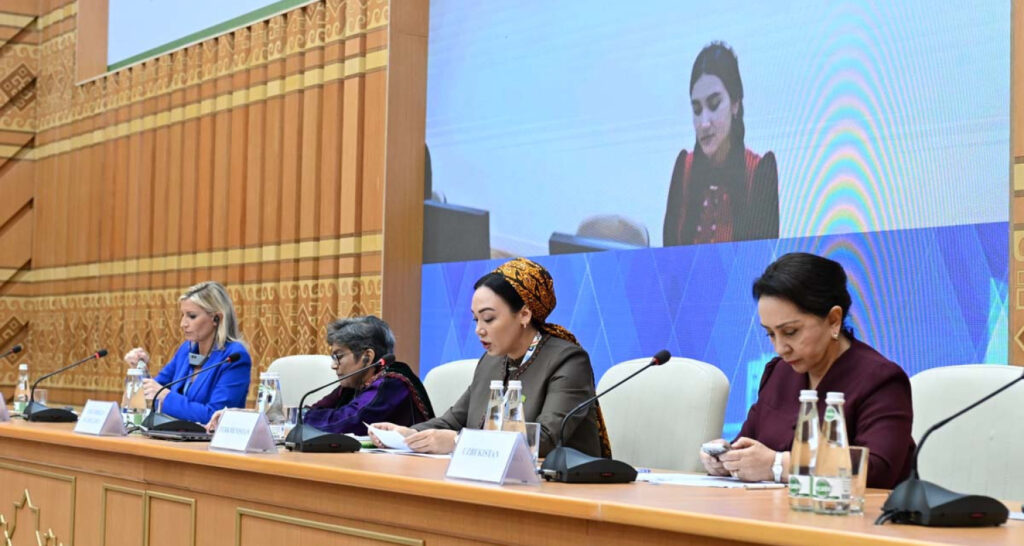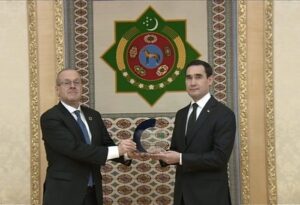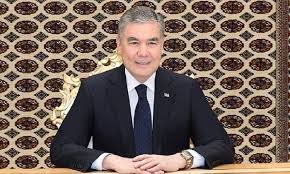Women Leaders Forum in Avaza Highlights Key Role of Women in Advancing Sustainable Development for Landlocked Developing Countries

Avaza, The Gulf Observer: On 7 August 2025, as part of the Third United Nations Conference on Landlocked Developing Countries (LLDCs), a high-level meeting of women leaders was held under the theme: “From Commitments to Change: Women as Drivers of the Avaza Agenda for Landlocked Developing Countries.” The event was jointly organized by the UN Secretariat and the Government of Turkmenistan in Avaza.
The forum gathered parliamentary leaders and representatives from LLDCs, along with delegates from international organizations and civil society. Discussions centered on the crucial role of women in advancing sustainable development and inclusive governance within landlocked nations.
UN Under-Secretary-General Rabab Fatima, High Representative for the Least Developed Countries, Landlocked Developing Countries and Small Island Developing States, opened the forum by commending Turkmenistan for hosting the event. She called the meeting a valuable platform for experience-sharing, solution-building, and cooperation, and emphasized that the Avaza Action Programme’s gender equality goals are vital for addressing the challenges women face in LLDCs.
Chairperson of the Mejlis of Turkmenistan, Dunyagozel Gulmanova, reiterated Turkmenistan’s commitment—under the leadership of President Serdar Berdimuhamedov—to strengthening global cooperation in trade, economy, culture, and humanitarian affairs.
The forum also saw remarks from Tanzila Narbaeva, Chairperson of the Senate of Uzbekistan, who praised Turkmenistan’s efforts and extended gratitude to the National Leader of the Turkmen people and Chairperson of the Halk Maslahaty for their unwavering support in empowering women across Central Asia.
Maryam bint Ali bin Nasser Al-Misnad, Secretary of State for International Cooperation of the Ministry of Foreign Affairs of Qatar, hailed the forum as a demonstration of collective efforts to tackle the shared challenges of women in LLDCs. She expressed gratitude for the warm hospitality extended by Turkmenistan.
Sevil Mikayilova, Vice-President of the Executive Committee of the Inter-Parliamentary Union, stressed that empowering women in decision-making is a proven strategy for strengthening governance and achieving inclusive development.
Speaking on behalf of the United Nations Development Programme (UNDP), Ivana Živković, Director of the Regional Bureau for Europe and the CIS, reaffirmed UNDP’s commitment to working with governments and civil society to support the implementation of the Avaza Action Programme. She emphasized that achieving gender equality requires concrete action, and that the Programme offers meaningful opportunities in this regard.
Oguljahan Atabayeva, Vice President for Medical Activities of the Charity Fund for Providing Assistance to Children in Need of Guardianship named after Gurbanguly Berdimuhamedov, also addressed the forum. She spoke about the Foundation’s efforts to protect the physical and spiritual well-being of young Turkmen citizens, concluding her remarks with a quote from Mother Teresa: “Women are the heart of the home. Let us pray that we women will realize the meaning of our existence: to love and be loved, and through this love to become instruments of peace throughout the world.”
The interactive sessions underscored the need for women’s economic empowerment as a cornerstone for building inclusive and resilient societies. Participants highlighted the importance of integrating gender perspectives into all development policies.
At the conclusion of the forum, a Final Document was adopted, reflecting the shared commitments of participating nations and organizations. Participants collectively expressed appreciation to the Government of Turkmenistan for the high-level organization and hospitality.
In closing remarks, Oguljahan Atabayeva drew attention to the global plight of children in need of guardianship, urging the international community to adopt a more proactive stance and uphold the UN Charter’s principles when addressing such humanitarian concerns.


